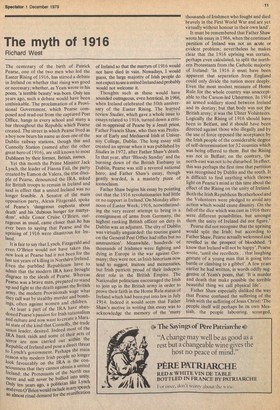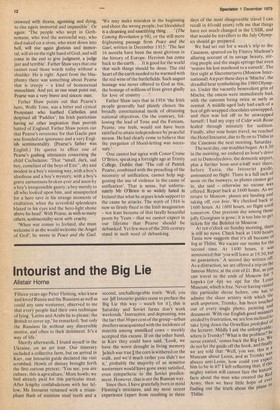The myth of 1916
Richard West
The centenary of the birth of Patrick Pearse, one of the two men who led the Easter Rising of 1916, has stirred a debate in Ireland on whether that rising was good or necessary; whether, as Yeats wrote in his poem, 'a terrible beauty' was born. Only ten years ago, such a debate would have been unthinkable. The proclamation of a Provisional Government, which Pearse composed and read out from the captured Post Office, hangs in every school and many a bar throughout the Republic which Pearse created. The street in which Pearse lived as a boy now bears his name as does one of the Dublin railway stations, though this and Connolly Station (named after the other great hero of 1916), are still known to most Dubliners by their former, British, names. Yet this month the Prime Minister Jack Lynch, the leader of Fianna Fail, the party created by Eamon de Valera, the true disciple of Pearse, denounced the IRA, asked for British troops to remain in Ireland and said in effect that a united Ireland was no longer feasible. A Senator of the main Opposition party, Alexis Fitzgerald, spoke of Pearse's 'dangerous euphoria about death' and his 'dubious hunger for martyrdom', while Conor Cruise O'Brien, outrageous as usual, came closer than he has ever been to saying that Pearse and the Uprising of 1916 were disastrous for Ireland.
It is fair to say that Lynch, Fitzgerald and even O'Brien would not have taken this new look at Pearse had it not been for the last ten years of killing in Northern Ireland. Even the purblind Republicans have to admit that the modern IRA have brought disgrace to the ideals of Pearse. Whereas Pearse was a brave man, prepared to stand aP and fight to the death against the British arm-y, the modern PrOViSi011aiS wage what they call war by stealthy murder and bombings, often against women and children. At least a part of the IRA have abandoned Pearse's passion for Irish nationalism and culture and now want to create a Marxist state of the kind that Connolly, the trade union leader, desired. Indeed most of the IRA bank raids and some of their acts of terror are now carried out within the Republic of Ireland and pose a direct threat to Lynch's government. Perhaps the main ,reason why modern Irish people no longer look favourably on the IRA is the consciousness that they cannot obtain a united Ireland: the Protestants of the North can never and will never be bullied into unity. Only ten years ago, a politician like Lynch and even O'Brien would include in any speech an almost ritual demand for the reunification of Ireland so that the martyrs of 1916 would not have died in vain. Nowadays, I would guess, the large majority of Irish people do not expect to see a united Ireland and probably would not welcome it.
Thoughts such as these would have sounded outrageous, even heretical, in 1966, when Ireland celebrated the 50th anniversary of the Easter Rising. The learned review Studies, which gave a whole issue to essays related to 1916, turned down a critical re-appraisal of Pearse by a Jesuit priest, Father Francis Shaw, who then was Professor of Early and Mediaeval Irish at University College, Dublin. The long essay still created an uproar when it was published by Studies in 1972, after Father Shaw's death. In that year, after 'Bloody Sunday' and the burning down of the British Embassy in Dublin, Pearse was still a revered national hero; and Father Shaw's essay, though gently worded, is a masterly piece of iconoclasm.
Father Shaw begins his essay by pointing out that the 1916 revolutionaries had little or no support in Ireland.' On Monday afternoon of Easter Week, 1916, notwithstanding the very recent attempt to bring in a consignment of arms from Germany, the highest ranking British officer on duty in Dublin was an adjutant. The city of Dublin was virtually unguarded: the routine guard on the General Post Office had rifles but no ammunition'. Meanwhile, hundreds of thousands of Irishmen were fighting and dying in Europe in the war against Germany; they were not, as Irish historians now tend to suggest, traitors and mercenaries, but Irish patriots proud of their independent role in the British Empire. The Nationalist politicians encouraged the Irish to join up in the British army in order to prove their faith in the Home Rule status of Ireland which had been put into law in July 1914. Indeed it would seem that Father Shaw's motive in writing this essay was to acknowledge the memory of the 'many thousands of Irishmen who fought and died bravely in the First World War and are yet virtually without honour in their own land'.
It must be remembered that Father Shaw wrote his essay in 1966, when the continued partition of Ireland was not an acute or evident problem; nevertheless he makes clear that the 1916 uprising was certain, perhaps even calculated, to split the northern Protestants from the Catholic majority of Ireland: 'In 1916 it must have been apparent that separation from England could only divide the nation more deeply. Even the most modest measure of Home Rule for the whole country was unacceptable to the Carson-led Ulstermen. In 1914 an armed soldiery stood between Ireland and its destiny; but that body was not the British army; it was the Ulster Vohinteers. Logically the Rising of 1916 should have been in Belfast, and it should have been directed against those who illegally and by the use of force opposed the acceptance by the Irish people of the considerable degree of self-determination for 32 counties which was being offered to them. But the Rising was not in Belfast; on the contrary, the north-east was not to be disturbed. In effect, this was perhaps the first time that partition was recognised by Dublin and the south. It is difficult to find anything which throws light on Pearse's mind at this time about the effect of the Rising on the unity of Ireland. Both the Irish Republican Brotherhood and the Volunteers were pledged to avoid any action which would cause disunity. On the fall of the dice which was cast in 1916 there were different possibilities, but amongst them the unity of Ireland did not figure.'
Pearse did not recognise that the uprising would split the Irish; but according to Father Shaw, Pearse actually welcomed and revelled in the prospect of bloodshed. 'I know that Ireland will not be happy', Pearse wrote, 'until she recollects. . that laughing gesture of a young man that is going into battle or climbing to a gibbet'. A few years earlier he had written, in words oddly suggestive of Yeats's poem, that: 'It is murder and death that make possible the terrible beautiful thing we call physical life'. Father Shaw especially disliked the way that Pearse confused the suffering of the Irish with the suffering of Jesus Christ: 'The people itself will perhaps be its own Messiah, the people labouring, scourged, crowned with thorns, agonising and dying, to rise again immortal and impassible'. Or again: The people who wept in Gethsemane, who trod the sorrowful way, who died naked on a cross, who went down into hell, will use again glorious and immortal, will sit on the right hand of God, and will come in the end to give judgment, a judge just and terrible'. Father Shaw says that one cannot read those words today without a shudder. He is right. Apart from the blasphemy there was something about Pearse that is creepy — a kind of homosexual masochism. And yet, as one must point out, Pearse was a very brave and sincere man.
Father Shaw points out that Pearse's hero, Wolfe Tone, was a bitter and cynical Protestant who loathed Catholics and despised all 'Paddies'; his Irish patriotism having no other inspiration than peevish hatred of England. Father Shaw points out that Pearse's reverence for that Gaelic past was founded on ignorance and a very English sentimentality. (Pearse's father was English.) He quotes to effect one of Pearse's gushing utterances concerning the child Cuchulainn: 'That "small, dark, sad boy, comeliest of the boys of Eire", shy and modest in a boy's winning way, with a boy's aloofness and a boy's mystery, with a boy's grave earnestness broken ever and anon by a boy's irresponsible gaiety; a boy merely to all who looked upon him, and unsuspected for a hero save in his strange moments of exaltation, when the sevenfold splendours blazed in his eyes and the hero-light shone above his head'. With Pearse, as with so many others, sentimentality went with cruelty.
'When war comes to Ireland, she must welcome it as she would welcome the Angel of God', he wrote in Peace and the Gael. 'We may make mistakes in the beginning and shoot the wrong people; but bloodshed is a cleansing and sanctifying thing. . . '(The Coming Revolution p 98), or the still more frightening passage from Peace and the Gael, written in December 1915: 'The last 16 months have been the most glorious in the history of Europe. Heroism has come back to the earth. . . It is good for the world that such things should be done. The old heart of the earth needed to be warmed with the red wine of the battlefields. Such august homage was never offered to God as this, the homage of millions of lives given gladly for love of country . .
Father Shaw says that in 1916 'the Irish people generally had plainly chosen the broadly constitutional mode of obtaining national objectives. On the contrary, following the lead of Tone and the Fenians, Pearse, one feels, would not have been satisfied to attain independence 113ipeaceful means. He had clearly come to believe that the purgation of blood-letting was necessary.'
One cannot but agree with Conor Cruise O'Brien, speaking a fortnight ago at Trinity College, Dublin that: The cult of Patrick Pearse, combined with the preaching of the necessity of unification, cannot help suggesting the use of violence in the cause of unification'. That is sense, but unfortunately Mr O'Brien is so widely hated in Ireland that what he argues lends support to the cause he attacks. The myth of 1916 is now so firmly fixed in the Irish imagination — not least because of that fatally beautiful poem by Yeats — that we cannot expect in our lifetime that Pearse should be debunked. Yet few men of the 20th century stand in such need of debunking.












































 Previous page
Previous page